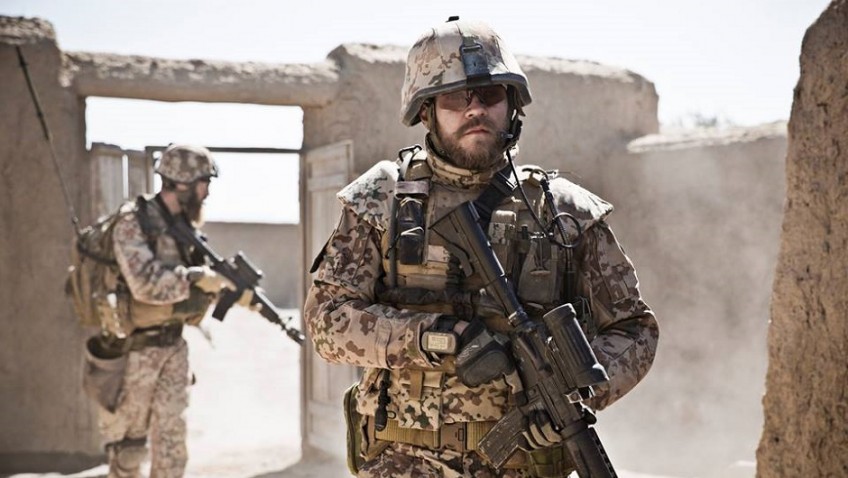Joyce Glasser reviews A War
Camouflaged, well-equipped troops walk in single file over the inhospitable, arid landscape of Helmand Province, Afghanistan. The tension mounts as the camera focuses on their boots. Then the inevitable happens: a mine explodes, blowing a soldier, a comrade, and someone’s son to pieces. If this opening scene seems familiar, little that follows will. Only those who have seen Danish Writer/Director Tobias Lindholm’s excellent, 2012 thriller, A Hijacking, will know that A War is going to be a different kind of war movie.
In A Hijacking, Lindholm put freighter cook Mikkel Hartmann (Pilou Asbaek) through the physical and psychological ringer as a hostage at sea. Back home, the shipping company manager, an astute businessman, is out of his depths negotiating with barbarians, with the added pressure of Hartmann’s family frantically waiting for a miracle. This time, Pilou Asbaek is put through the psychological ringer as Claus Pedersen, a respected squadron commander who returns to his wife (Tuva Novotny – marvellous) and children in Denmark as traumatised as the cook, but for a different reason.
That the squadron and the family are Danish makes the film of particular interest in that Denmark has not been the target of a major terrorism atrocity. The use of the indefinite article in the title, however, intentionally deprives the war of any particular identity. For the Danish soldiers, however, morale at the camp is low as the men do not understand why they are risking their lives in someone else’s war against an enemy that could be anyone, including children and the local merchants’ wives. Claus Pedersen’s family at home feel far less patriotic pride than anxiety and loss.
The death of a comrade by a landmine leaves one soldier so traumatised that Pedersen goes on patrol himself, abandoning his post to boost morale and be amongst his men. When his patrol unit is caught in an ambush that leaves a soldier dying in a civilian family’s home, Pedersen is under enormous pressure. Like the shipping company manager in A Hijacking, Pedersen is dealing with a non-traditional enemy and must think under pressure in the midst of chaos and with little information. Caught between a rock and hard place he makes a decision that changes his, and his family’s life.
In A Hijacking, there were two fronts: the freighter at sea and the shipping office in Denmark. In A War, the fronts are Helmand Province and Pedersen’s home in Denmark. The emphasis on the family in A War makes us consider to what extent even a war on foreign soil has profound repercussions on the soldier’s entire family.
In A War, however, the two Danish fronts expand to a third front when the film takes a surprising turn just after the half-way point in the film. It is this turn that will make A War one the most topical and morally challenging films of the year.
What strikes the viewer in both films is how Lindholm approaches his subject like an anthropologist so that nothing is predictable. His characters act and react according to their personalities and the situations they are in, not according to our expectations. A mixture of non-professional and professional actors – with most of the soldiers being actual soldiers – supports Lindholm’s realistic style. Nothing feels scripted, although the film is in fact the result of extensive research and skilful scriptwriting.
Alfred Hitchcock would approve of Lindholm’s economical and visual story telling: he never tells us what the camera or a character can show us, increasing the immediacy of the action and our involvement. Yet it is the cathartic emotional payoff and, in particular, the penetrating moral question at the heart of the film that will leave you thinking about A War long after leaving the cinema.




